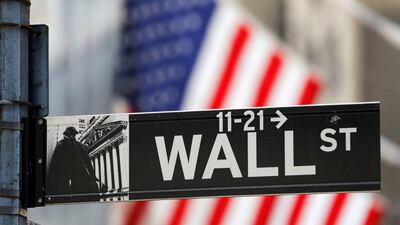Stocks closed at the highest in a month as data showed a decline in inflation expectations and big banks rebounded from losses driven by worrisome outlooks. Treasuries retreated.
Ahead of Monday’s US holiday, the S&P 500 crossed its 200-day moving average and finished within a hair of 4,000.
JP Morgan, Bank of America, Citigroup and Wells Fargo, which reported results, pushed higher.
The Nasdaq 100 climbed for a sixth straight day, the longest winning run since November 2021 — the month when it hit an all-time high.
“While equity and bond markets are overbought in the near term and potentially exposed to a pullback and/or a period of volatility, there are reasons for cautious optimism for the year,” said Mark Hackett, chief of investment research at Nationwide.
US short-term inflation views fell in early January to the lowest in nearly two years, providing a bigger-than-expected boost to consumer sentiment.
To Jeffrey Roach at LPL Financial, pricing pressures are weakening across many sectors, paving the way for the Federal Reserve to downshift its pace of hikes to 25 basis points at its next gathering.
“We shouldn’t be surprised if the Fed starts talking about pausing in the near future,” he said.
Fed Bank of Atlanta president Raphael Bostic told CBS News he’s leaning towards supporting a smaller rate hike at the next meeting following Thursday’s report showing a further slowing in prices.
Over the next few weeks, traders will get a sense on how the aggressive Fed policy to tame inflation has weighed on profit margins.
JP Morgan’s boss Jamie Dimon said that while the economy remains strong, “we still do not know the ultimate effect of the headwinds coming”.
Corporate earnings have yet to fully reflect the impact of last year’s rate hikes, according to Mark Haefele at UBS Global Wealth Management.
He expects fourth-quarter results to provide a “reality check”, with an earnings recession in 2023 being probable.
To Peter Oppenheimer at Goldman Sachs Group, there’s an important distinction between financial markets and the economy.
“We do have a relatively positive view on economies globally: in fact, we are not looking at a recession in the US this year,” he told Bloomberg Television.
“Because of that strength, interest-rate risk remains higher than the market is pricing. And that’s what feeds into a more cautious view for equity markets.”
S&P 500 earnings revisions are pointing to “a hard landing”, even though the market is pricing in a soft landing, Goldman Sachs strategists led by David Kostin wrote.
If there is no recession, as the team expects, S&P 500 earnings per share growth will be flat this year, they said.
US stocks are poised for a fresh slide before ultimately rallying in the second half of the year when economic conditions stabilise, according to Bank of America strategists.
“It’s a back-and-forth market,” said David Donabedian, chief investment officer of CIBC Private Wealth US.
“I don’t really buy the intense gloom that some people have that it’s going to get much worse, or the other extreme that we’ve already started a new bull market. I don’t think we’re there yet either.”
Former Treasury Secretary Lawrence Summers said that the US economy is still facing a recession this year, despite encouraging news in recent weeks.
“We’ve been in the inflationary bus, which is a fancy way of saying stagflation, and that’s not a great environment for financial assets,” said Jack McIntyre, portfolio manager at Brandywine Global.
“Equities don’t like the slowing economic activity and bonds don’t like the inflation part of it. So, we should get resolution this year on how do we break out of that stagflationary environment.”

